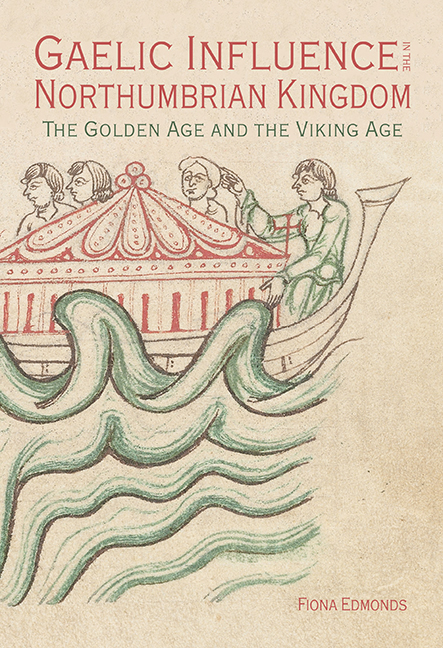Book contents
- Frontmatter
- Contents
- List of Illustrations
- Acknowledgements
- List of Abbreviations
- Preface: An Eventful Voyage
- 1 Concepts and Historiography of the Northumbrian and Gaelic Worlds: Medieval to Modern
- 2 Exiles and Emperors: Gaelic-Northumbrian Political Relations in the Golden Age
- 3 Fragmentation and Opportunity: From the Eighth Century to the Viking Age
- 4 Pathways through the Past: Routes between the Gaelic World and the Northumbrian Kingdom
- 5 A Golden Age of Ecclesiastical Contacts
- 6 Saints and Seaways in the Viking Age
- 7 Medieval Multilingualism: Gaelic Linguistic Influence in the Northumbrian Kingdom
- 8 Movement and Material Culture in the Northumbrian and Gaelic Worlds
- Conclusion: Individuals and Influences
- Bibliography
- Index
- STUDIES IN CELTIC HISTORY
3 - Fragmentation and Opportunity: From the Eighth Century to the Viking Age
Published online by Cambridge University Press: 28 February 2020
- Frontmatter
- Contents
- List of Illustrations
- Acknowledgements
- List of Abbreviations
- Preface: An Eventful Voyage
- 1 Concepts and Historiography of the Northumbrian and Gaelic Worlds: Medieval to Modern
- 2 Exiles and Emperors: Gaelic-Northumbrian Political Relations in the Golden Age
- 3 Fragmentation and Opportunity: From the Eighth Century to the Viking Age
- 4 Pathways through the Past: Routes between the Gaelic World and the Northumbrian Kingdom
- 5 A Golden Age of Ecclesiastical Contacts
- 6 Saints and Seaways in the Viking Age
- 7 Medieval Multilingualism: Gaelic Linguistic Influence in the Northumbrian Kingdom
- 8 Movement and Material Culture in the Northumbrian and Gaelic Worlds
- Conclusion: Individuals and Influences
- Bibliography
- Index
- STUDIES IN CELTIC HISTORY
Summary
Northumbrian politics became more introspective during the eighth century. The kingdom was riven by internecine rivalries and the power of the nobility grew, limiting the influence of Northumbrian kings. Gaeldom was also changing: in the second quarter of the eighth century, Cenél Conaill lost its pre-eminence in the northern parts of Ireland, Síl nÁeda Sláine its dominance in the Irish Midlands, and Dál Riata was subdued by a Pictish king, Onuist son of Uurguist. Then came the Viking attack on Lindisfarne in 793, which caused shock far beyond the Northumbrian kingdom, and was soon followed by raids in the Irish Sea. These events accelerated Northumbria’s disintegration: the kingdom's political makeup looked very different by the tenth century, even if the concept of a Northumbrian polity persisted. Yet this fragmentation ultimately heightened and diversified the opportunities for Gaelic influence and encroachment during the Viking Age.
Years of decline? The eighth and ninth centuries
Before exploring this apparently turbulent era, it is worth asking how changes in the source material affect our understanding of Northumbria's external relations. Bede said less about his contemporaries than he did about the Golden Age; he thought that his own generation fell short of their seventh-century forebears, and he sought to inspire improvements among his contemporaries. After Bede, the sources diminish further in detail: the northern annals are laconic and the core text of the ‘Chronicle of Ireland’ shifted from Iona to the Irish Midlands ca 740. Northern Britain featured less prominently in this phase of the chronicle, even if some information filtered through from Iona and Pictland. Notwithstanding these points, I would argue that there was a real decline in Northumbrian–Gaelic diplomatic contacts during the eighth century, and I would seek the reasons not only in the Northumbrian kingdom, but also in the Gaelic world.
There were already signs of weakness in the rule of Æthelfrith's line by the early eighth century. Before Aldfrith's son, Osred, could succeed to kingship, the throne was briefly seized by Eadwulf son of Ecgwulf, who came from a rival Bernician line. The Iona chronicler took an interest in Eadwulf and his son, and there are hints that they fled to Pictland.
- Type
- Chapter
- Information
- Gaelic Influence in the Northumbrian KingdomThe Golden Age and the Viking Age, pp. 45 - 71Publisher: Boydell & BrewerPrint publication year: 2020

